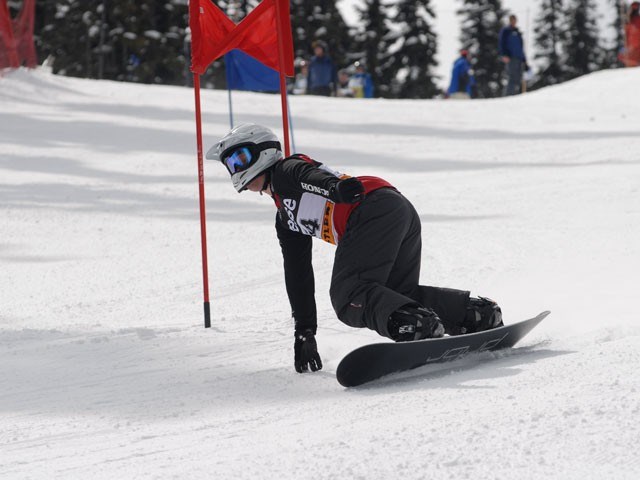The Canadian Snowboard Federation and World Snowboard Federation are hosting the first ever adaptive snowboarding World Cup in Whistler Friday, March 14, with riders from five countries expected to take part.
The end goal of the CSF is to add snowboarding to the Paralympic roster of sports, recognizing the growing number of persons with disabilities taking part in the sport — many getting involved through adaptive snowboarding programs offered by organizations like the Whistler Adaptive Sports Program and the National Sports Center for the Disabled at Winter Park, Colorado. Events like the World Cup in Whistler are crucial to attract the attention of the International Paralympic Committee.
This weekend’s main event is a race on the Blackcomb snowboardcross course, with every athlete getting two runs, and prizes for the top-three men and women in every class. Athletes from the U.S., Europe, Australia and New Zealand are expected to attend, racing against seven confirmed athletes from Canada. Training has been ongoing daily, and the race will run from 1 p.m. to 3 p.m. on Friday, followed by awards at 4 p.m. at the base of Blackcomb.
One of those athletes is Whistler’s Tyler Mosher, who sustained a spinal cord injury while snowboarding in 2000 and is now classified as an incomplete paraplegic — he can walk, but has reduced mobility below his waist.
Mosher is now a member of Cross Country Canada’s 2010 development team and is working to compete at home in the 2010 Paralympic Winter Games, but he has also been one of the strongest advocates in recent years for bringing adaptive snowboarding to the Paralympics. He worked with the Canadian Snowboard Federation several years to create a national program for the sport, and is now looking forward to racing at home.
“It’s a dream come true, and though I wish there were more nations here all I can do is concentrate on me and winning,” he said. “If we’re setting up a program and want everyone to do well, fine, I think everyone would approach it differently, but this is a World Cup event and I’m coming into it with my game face on. I expect all the other racers to do the same.”
Mosher’s disability means he has no sensitivity on his heel side, but other than some small modifications to his bindings he’s mostly relying on his experience snowboarding from before his accident to get down the snowboardcross track.
The parallel giant slalom event would have suited him better, Mosher likes the snowboardcross format.
“I think it was a good compromise, and that anything that can be timed is the best,” he said. “It’s really closer to a banked slalom than a snowboardcross, because we’re all going one at a time, but this format has something for everybody — getting some air, having fun, freeriding, big turns, and it’s softboot friendly…it’s the best compromise that uses all of our skills and is still fun. That said, you still have to be half-decent to be able to do it…and everybody here is pretty good. I was surprised how good everyone is.”
Other Canadians to watch for include Ian Lockey of Rossland, who is also an incomplete paraplegic; Emily Cavallin, a below the knee amputee from Smithers; John Clark, a below the knee amputee from Orillia, Ontario; Devin Tuson, an amputee from Calgary; Mike Fisher, a below the knee amputee from Forest, Ontario; and Corey Hansen, a rider from Oxford, Nova Scotia with oral-facial-digital syndrome.
The World Cup race is also a prelude to other events relating to adaptive snowboarding. The Canadian Adaptive Snowboard Program is hosting an international summit in Whistler March 11-15 to discuss the development of adaptive snowboarding athletes, coaches, officials and administrators.
As well, CASP is hosting an international sport building workshop Saturday, March 15, to look at ways to develop adaptive snowboarding from the grass roots regional level into a World Cup event. One of the goals is to develop a network of experts and resources to guide the development of the sport.




